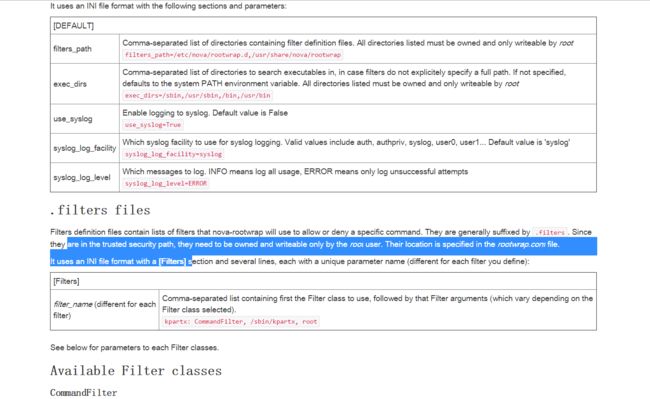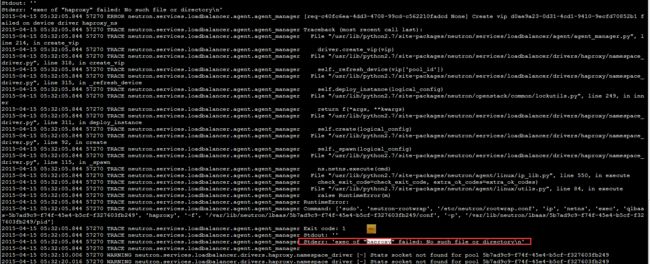lbaas及heat-autoscaling(juno)
实例模板:
https://github.com/openstack/heat-templates/tree/master/hot
key是keypair
其中下述命令中各参数可以用nova net-list nova flavor-list获取:
|
heat stack-create -f autoscaling.yaml autoscale-ttx -P "database_flavor=m1.tiny;subnet_id=4beaf460-414f-4ae2-a51e-63b047d67e80;external_network_id=338ebf32-6128-4b47-962b-f19409e55261;image=cirros-0.3.3-x86_64;key=ttx-keypair;flavor=m1.tiny;network=4c676ea1-06a6-4235-8326-6c88aaf7fb15"
|
systemctl restart openstack-heat-api.service openstack-heat-api-cfn.service openstack-heat-engine.service
heat --debug stack-create -f autoscaling.yaml -P "database_flavor=m1.tiny;subnet_id=4beaf460-414f-4ae2-a51e-63b047d67e80;external_network_id=338ebf32-6128-4b47-962b-f19409e55261;image=cirros-0.3.3-x86_64;key=ttx-keypair;flavor=m1.tiny;network=4c676ea1-06a6-4235-8326-6c88aaf7fb15" auto-test-1
tailf /var/log/heat/heat-engine.log
网络报错,最后发现是没有按照LbaaS导致:
http://docs.openstack.org/admin-guide-cloud/content/install_neutron-lbaas-agent.html
|
ERROR neutron.agent.linux.utils [req-6533de47-c74c-412c-b98f-8289e6948277 None]
Command: ['sudo', 'neutron-rootwrap', '/etc/neutron/rootwrap.conf', 'ip', 'netns', 'exec', 'qlbaas-8dfb5a4e-ef87-4f14-9a11-d58bd24e4d70', 'haproxy', '-f', '/var/lib/neutron/lbaas/8dfb5a4e-ef87-4f14-9a11-d58bd24e4d70/conf', '-p', '/var/lib/neutron/lbaas/8dfb5a4e-ef87-4f14-9a11-d58bd24e4d70/pid']
Exit code: 99
|
|
sudo neutron-rootwrap /etc/neutron/rootwrap.conf ip netns exec qlbaas-8dfb5a4e-ef87-4f14-9a11-d58bd24e4d70 haproxy -f /var/lib/neutron/lbaas/8dfb5a4e-ef87-4f14-9a11-d58bd24e4d70/conf -p /var/lib/neutron/lbaas/8dfb5a4e-ef87-4f14-9a11-d58bd24e4d70/pid
|
直接输入命令测试:
说明是
neutron-rootwrap没有操作ip该命令权限:
官方wiki:
https://wiki.openstack.org/wiki/Rootwrap
看官方文档,如果发觉e文不好理解的话,最好的方式就是参考现成的写法:
vim /etc/nova/rootwrap.conf
vim /usr/share/nova/rootwrap/compute.filters
从上图可知,
1、第一列为名称,永远与第三列相同
2、第二列固定为CommandFilter,第四列永远为root
3、似乎ip该项以及加入到nova的nova-rootwrap权限中了
试验nova-rootwrap 对ip命令权限:
下面就直接照抄copy一份即可了:
vim /usr/share/neutron/rootwrap/ip.filters
ok,权限解决。
继续生成:
直接yum install haproxy -y
lbaas终于搞定。
继续用上述脚本autoscaling:
接下来还是大概分析下autoscaling的heat模块:
autoscaling.yaml
|
heat_template_version: 2013-05-23
#heat模板版本
description: AutoScaling Wordpress parameters: #下面为通过命令行输入的参数 image: #镜像id或者名字 type: string description: Image used for servers key: #keypair名字 type: string description: SSH key to connect to the servers flavor:# 此处为虚拟机规格,解释说明了,是web服务虚拟机 type: string description: flavor used by the web servers database_flavor: #此处为虚拟机规格,解释说明了,是用来安装数据库的后端服务虚拟机 type: string description: flavor used by the db server network: #网络 type: string description: Network used by the server subnet_id: #子网id type: string description: subnet on which the load balancer will be located database_name: #数据库名 type: string description: Name of the wordpress DB default: wordpress database_user: #数据库用户 type: string description: Name of the wordpress user default: wordpress external_network_id: #外网id type: string description: UUID of a Neutron external network resources: #资源属性列表 database_password: type: OS::Heat::RandomString database_root_password: type: OS::Heat::RandomString db: type: OS::Nova::Server properties: flavor: {get_param: database_flavor} #获取上述parameters列表中命令行输入的参数值 image: {get_param: image} #下述同上,获取参数值 key_name: {get_param: key} networks: [{network: {get_param: network} }] user_data_format: RAW user_data: str_replace: template: | #!/bin/bash -v yum -y install mariadb mariadb-server systemctl enable mariadb.service systemctl start mariadb.service mysqladmin -u root password $db_rootpassword cat << EOF | mysql -u root --password=$db_rootpassword CREATE DATABASE $db_name; GRANT ALL PRIVILEGES ON $db_name.* TO "$db_user"@"%" IDENTIFIED BY "$db_password"; FLUSH PRIVILEGES; EXIT EOF params: $db_rootpassword: {get_attr: [database_root_password, value]} $db_name: {get_param: database_name} $db_user: {get_param: database_user} $db_password: {get_attr: [database_password, value]} asg: type: OS::Heat::AutoScalingGroup properties: min_size: 1 max_size: 3 resource: type: lb_server.yaml properties: flavor: {get_param: flavor} image: {get_param: image} key_name: {get_param: key} network: {get_param: network} pool_id: {get_resource: pool} metadata: {"metering.stack": {get_param: "OS::stack_id"}} user_data: str_replace: template: | #!/bin/bash -v yum -y install httpd wordpress systemctl enable httpd.service systemctl start httpd.service setsebool -P httpd_can_network_connect_db=1 sed -i "/Deny from All/d" /etc/httpd/conf.d/wordpress.conf sed -i "s/Require local/Require all granted/" /etc/httpd/conf.d/wordpress.conf sed -i s/database_name_here/$db_name/ /etc/wordpress/wp-config.php sed -i s/username_here/$db_user/ /etc/wordpress/wp-config.php sed -i s/password_here/$db_password/ /etc/wordpress/wp-config.php sed -i s/localhost/$db_host/ /etc/wordpress/wp-config.php systemctl restart httpd.service params: $db_name: {get_param: database_name} $db_user: {get_param: database_user} $db_password: {get_attr: [database_password, value]} $db_host: {get_attr: [db, first_address]} web_server_scaleup_policy: type: OS::Heat::ScalingPolicy properties: adjustment_type: change_in_capacity auto_scaling_group_id: {get_resource: asg} cooldown: 60 scaling_adjustment: 1 web_server_scaledown_policy: type: OS::Heat::ScalingPolicy properties: adjustment_type: change_in_capacity auto_scaling_group_id: {get_resource: asg} cooldown: 60 scaling_adjustment: -1 cpu_alarm_high: type: OS::Ceilometer::Alarm properties: description: Scale-up if the average CPU > 50% for 1 minute meter_name: cpu_util statistic: avg period: 60 evaluation_periods: 1 threshold: 50 alarm_actions: - {get_attr: [web_server_scaleup_policy, alarm_url]} matching_metadata: {'metadata.user_metadata.stack': {get_param: "OS::stack_id"}} comparison_operator: gt cpu_alarm_low: type: OS::Ceilometer::Alarm properties: description: Scale-down if the average CPU < 15% for 10 minutes meter_name: cpu_util statistic: avg period: 600 evaluation_periods: 1 threshold: 15 alarm_actions: - {get_attr: [web_server_scaledown_policy, alarm_url]} matching_metadata: {'metadata.user_metadata.stack': {get_param: "OS::stack_id"}} comparison_operator: lt monitor: type: OS::Neutron::HealthMonitor properties: type: TCP delay: 5 max_retries: 5 timeout: 5 pool: type: OS::Neutron::Pool properties: protocol: HTTP monitors: [{get_resource: monitor}] subnet_id: {get_param: subnet_id} lb_method: ROUND_ROBIN vip: protocol_port: 80 lb: type: OS::Neutron::LoadBalancer properties: protocol_port: 80 pool_id: {get_resource: pool} # assign a floating ip address to the load balancer # pool. lb_floating: type: OS::Neutron::FloatingIP properties: floating_network_id: {get_param: external_network_id} port_id: {get_attr: [pool, vip, port_id]} outputs: scale_up_url: description: > This URL is the webhook to scale up the autoscaling group. You can invoke the scale-up operation by doing an HTTP POST to this URL; no body nor extra headers are needed. value: {get_attr: [web_server_scaleup_policy, alarm_url]} scale_dn_url: description: > This URL is the webhook to scale down the autoscaling group. You can invoke the scale-down operation by doing an HTTP POST to this URL; no body nor extra headers are needed. value: {get_attr: [web_server_scaledown_policy, alarm_url]} pool_ip_address: value: {get_attr: [pool, vip, address]} description: The IP address of the load balancing pool website_url: value: str_replace: template: http://host/wordpress/ params: host: { get_attr: [lb_floating, floating_ip_address] } description: > This URL is the "external" URL that can be used to access the Wordpress site. ceilometer_query: value: str_replace: template: > ceilometer statistics -m cpu_util -q metadata.user_metadata.stack=stackval -p 600 -a avg params: stackval: { get_param: "OS::stack_id" } description: > This is a Ceilometer query for statistics on the cpu_util meter Samples about OS::Nova::Server instances in this stack. The -q parameter selects Samples according to the subject's metadata. When a VM's metadata includes an item of the form metering.X=Y, the corresponding Ceilometer resource has a metadata item of the form user_metadata.X=Y and samples about resources so tagged can be queried with a Ceilometer query term of the form metadata.user_metadata.X=Y. In this case the nested stacks give their VMs metadata that is passed as a nested stack parameter, and this stack passes a metadata of the form metering.stack=Y, where Y is this stack's ID. |
lb_server.yaml
|
heat_template_version: 2013-05-23
description: A load-balancer server
parameters:
image:
type: string
description: Image used for servers
key_name:
type: string
description: SSH key to connect to the servers
flavor:
type: string
description: flavor used by the servers
pool_id:
type: string
description: Pool to contact
user_data:
type: string
description: Server user_data
metadata:
type: json
network:
type: string
description: Network used by the server
resources:
server:
type: OS::Nova::Server
properties:
flavor: {get_param: flavor}
image: {get_param: image}
key_name: {get_param: key_name}
metadata: {get_param: metadata}
user_data: {get_param: user_data}
user_data_format: RAW
networks: [{network: {get_param: network} }]
member:
type: OS::Neutron::PoolMember
properties:
pool_id: {get_param: pool_id}
address: {get_attr: [server, first_address]}
protocol_port: 80
|














